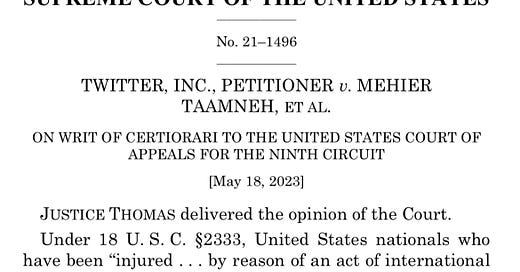Social media censorship update: the Supreme Court keeps its Section 230 powder dry
The highest court today ruled for Twitter and other social media companies against plaintiffs who sued them over hosting terrorist videos. The ruling is a major victory for the companies. Or is it?
On Thursday, the Supreme Court unanimously found that social media companies cannot be held liable for hosting content from terrorist groups like the Islamic State.
But the biggest legal question facing social media companies, and the hundreds of millions of Americans who use them, remained unanswered. The Court made no judgment on the federal law called Section 230, which has given the companies power to ban content and users anytime and for any reason (my victory in Berenson v Twitter is a nearly unique exception).
—
(FOR ANALYSIS YOU WON’T GET ANYWHERE ELSE)
—
Lower courts have said Section 230 offers nearly complete immunity to social media companies both for the content they host and their ban decisions. But the Supreme Court has never ruled on 230, which has become controversial as Twitter, Google, and Facebook become overwhelmingly powerful sources of information.
It could done so today, but chose not to.
Still, legal experts and the companies themselves portrayed the court’s twin rulings in two closely related cases - Twitter v. Taamneh and Gonzalez v. Google - as a major win. “Countless companies, scholars, creators and civil society groups who joined with us in this case will be reassured by this result,” Google said in a tweet.
In reality, the rulings today marked an important but narrow win for social media companies against lawsuits with serious factual and legal problems. The industry’s loud celebration may have more to do with its desire to keep its cloak of legal invulnerability intact than the ruling’s real impact.
That’s because the Court - rightly - found the two lawsuits were too weak on their own merits to proceed. In both cases, the families of Islamist terror victims claimed the companies had “aided and abetted” the attacks by hosting videos from the Islamic State and other terrorists. But the families did not allege that the companies had done anything but show videos which some of the terrorists might have seen. As Justice Clarence Thomas wrote in the Twitter opinion:
The relationship between defendants and the Reina attack is highly attenuated. As noted above, defendants’ platforms are global in scale and allow hundreds of millions (or billions) of people to upload vast quantities of information on a daily basis. Yet, there are no allegations that defendants treated ISIS any differently from anyone else. Rather, defendants’ relationship with ISIS and its supporters appears to have been the same as their relationship with their billion-plus other users: arm’s length, passive, and largely indifferent.
—
(That’s just your opinion, man!)
—
So it remains to be seen what the Court will do in a case when the companies were neither “passive” nor “largely indifferent” to the way they treated users - or when they faced federal pressure to take action, at the apparent risk of losing their precious 230 protection.
Like Berenson v Biden.





Sounds like the social media companies are getting it their way either way. We're not responsible for the content posted on our platforms but if the federal government urges us to ban somebody we will do it even though we're not responsible for the content on our platforms.
So at one moment they're claiming no responsibility and yet at another moment they'll do the bidding of the federal government in removing perfectly legal content.
Here I am trying to use logic and reason, silly me.
The legal issues involved are highly complex, but if I understand it correctly, the bottom line is that operators of social-media platforms seek immunity from these kinds of lawsuits on freedom-of-speech grounds, while at the same time claiming the right to restrict speech on those platforms?